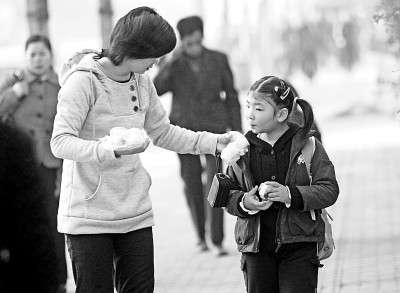"I" can get the first place in the exam but I don’t like studying. Why?


[Dialogue]
Nowadays, parents are anxious when it comes to their children’s study. They generally feel that their children don’t like to study and do their homework, which often leads to "war at home" because of urging their children to study, especially the parents of some students with good academic performance, which also reflects that their children don’t like to study. Why? An Fuhai, a professor at the Teacher Development Research Center of Hangzhou Normal University, interviewed students in some schools in view of this phenomenon, hoping that the conclusions will enlighten our current educational predicament.
1. "I love learning, and learning makes my mother happy!" The disharmony behind it
Reporter: Generally speaking, people think that children who don’t like learning are children with poor academic performance and bad study habits. But now many excellent primary and middle school students, even the first students in many classes, don’t like studying. Why is this?
An Fuhai: At the end of 2019, a class of junior high school students in a middle school sports meeting in Shenzhen typed "I love learning, and learning makes my mother happy!" The banner, once circulated, has gained a lot of resonance. Many primary and middle school students shouted "What a talent! Say ‘ Working people ’ The voice of ". The implication is that they don’t like learning either. The banner and the shouts of the adherents made the adults laugh, but the laughter was full of sadness. It was also during that time that the Organization for Economic Cooperation and Development (OECD) announced the test results of programme for international student assessment 2018 PISA2018. In the sampling test of 15-year-old students in 79 participating countries (regions), we achieved excellent results in three subjects (reading, mathematics and science). However, different from the "Celebration" after the announcement of our first prize in 2009 and 2012, the education sector began to rationally reflect on the problems exposed by the PISA test, including education balance, shortage of teachers, study time and teaching methods. In my opinion, we should also think deeply about the relationship between our students’ learning status and academic performance. Because the current situation of students’ learning tells us that there is a disharmony between their learning status and academic performance, that is, they have good academic performance but do not like learning.
Reporter: Common sense tells us that you can get good grades only if you like to study.
An Fuhai:After all, the results are obtained by the students themselves, so it is necessary to listen to the voices of the parties. With this "common sense", I randomly interviewed 60 students from three middle schools who participated in the 2018 PISA test. "Do you like studying? Will learning make you feel happy? " When hearing this question, most students just laughed and didn’t answer. The students’ answers mainly focus on these aspects: "Hehe, it’s ok"; "Like, not to mention, it should be said to be liked"; "Not very much"; "Study, homework, I immediately feel worse when I hear these two words"; "There are people who like to learn? Crazy, it must be crazy. " The number of students who answered "not bad" in each school is very small.
In fact, the data that students’ learning satisfaction in four provinces and cities in China ranks 61st among the participating countries (regions) has fully explained that good grades do not necessarily love learning. In addition, the PISA2018 test results also show that the learning efficiency of students in reading, mathematics and science in four provinces and cities in China and their sense of belonging to the school are also relatively low in the participating countries (regions). In other words, students not only dislike learning, but also have no sense of belonging to the school. In fact, this conclusion doesn’t need PISA test to tell us at all. Just walk into a school to observe a few classes or interview some students and teachers to get a similar understanding.
2. Every time except sleeping and eating time is filled with study.
Reporter: I don’t like learning, and my learning efficiency is relatively low. Why can I get the "first" grade?
An Fuhai:Prolonging study time is our magic weapon to win. Although the PISA2018 test results show that the average classroom study time of students in four provinces and cities in China ranks fourth among the participating countries (regions). However, the statistics here are only the study time arranged by the school, and the students’ extracurricular independent study time is not included. As we all know, Chinese students, especially those in big cities, spend an amazing amount of extra-curricular study time. It is learned from these three schools that most students spend about 3 hours a day after class in a week, with a total of 15 hours in five days; The study time for two days on weekends is about 8 hours. In this way, the total study time of Chinese students per week will definitely be far ahead among the 79 participating countries (regions). The PISA test results in 2012 also showed this problem. The Shanghai team represented the mainland of China in the total score of mathematics, reading and science, but it also won another first place, that is, the study time is the longest, with 13.8 hours per week, which is about 20 hours together with extracurricular tutoring, while the average of OECD countries is 7.8 hours.
If you think this statistic is not convincing enough, let’s take a look at the situation that parents attach importance to their children’s education. Most parents in China attach importance to education, and the most prominent performance is to enroll their children in various remedial classes from kindergarten. Statistics show that in 2019, families in Hangzhou spent 20,000-40,000 yuan on children’s extracurricular tutoring every year, and it rose to 30,000-50,000 yuan in 2020. Almost every family gives tutoring to their children, ranging from three to five or six. Parents’ high investment in education is enough for students to fill up their studies at every time except insufficient sleep time and hot meal time.
Reporter: Yes, primary and secondary school students are not getting enough sleep, and the myopia rate and obesity rate are increasing. People from all walks of life have been calling for these problems in recent years, but they have not been improved.
An Fuhai:Although several PISA tests have made China students’ excellent achievements proud, there are huge time costs, physical overdrafts and heavy costs for students to lose interest in learning. According to the survey in 2020, the average myopia rate of primary school students in China is about 36%, that of junior high school students is 71.6%, and that of senior high school students is 81%. The key point is that high myopia above 600 degrees accounts for 28% of the 81% myopia of senior high school students. In addition, the number of students suffering from depression in many key middle schools is increasing, and the number of students who commit suicide or have thought about suicide is also increasing year by year. Whether it is for families, individuals or the whole country, such a fact is too cruel, and such a price is unbearable for us.
3. I hate school and study, even if I get into a prestigious school, it is difficult to create outstanding achievements.
Reporter: Primary and middle school students get up the earliest, go to bed the latest, and work hard to get good grades, but in the end they don’t like learning. This phenomenon is really worrying. But maybe many parents don’t think so. In their view, as long as children get the first place in the exam, they can go to a good university and have a good job, so all the physical and mental efforts seem to be worth it.
An Fuhai:The good expectation of "Jackie Chan becomes a phoenix", the learning goal of "score first" and the learning process of repeated training make students hate learning, school and even knowledge, which seems nothing to some parents. However, we should deeply realize that a considerable number of seemingly excellent students are forced to study under various external pressures. Once the pressure is lifted, they will inevitably evade learning. What will be the future of those students who evade learning? This is not a disease-free groan and melodramatic sadness, but a problem that deserves our deep thought more than paying attention to score ranking. If a student hates school and doesn’t like studying, even if he can be admitted to a prestigious school in the future, it will be difficult to create outstanding achievements. Because he has no enthusiasm for learning and can’t experience the happiness of learning, it is impossible to devote more time and energy to studying what he has learned. We have learned a lesson in this respect. China began to participate in international Olympic mathematics competitions around 1985, including physics competitions, biology competitions and computer competitions. There are many winners every year, from 1985 to now for more than 30 years. Many foreign child prodigies who competed on the same stage as China’s child prodigies have become everyone in all fields, but we seldom contribute to the world. Take Tao Zhexuan, an Australian-born Chinese mathematician and winner of the Fields Medal for Mathematics, as an example. He was less than 13 years old when he won the Olympic gold medal in 1988. At that time, many students in China also won Olympic medals.However, few people have made such outstanding achievements as Tao Zhexuan, and most of them have been far away from mathematics.
Reporter: How important is it for the growth of students to love learning and be full of interest and enthusiasm for learning?
An Fuhai:The Fifth Plenary Session of the 19th CPC Central Committee proposed to improve the national innovation system and accelerate the construction of a powerful country through science and technology during the 14th Five-Year Plan period. It can be said that to achieve such a great goal, we need to cultivate innovative talents through education. Active interest in learning and pleasant learning experience are the internal motivation of learning, the foundation of healthy personality and the necessity of innovative talents. Interest is the best teacher. Once a person has a strong interest in something, he will take the initiative to seek knowledge, explore and practice. The positive emotion and pleasant experience generated in the process of seeking knowledge, exploration and practice will further promote new seeking knowledge, exploration and practice, which will lead learners to a happy road of learning and exploration. Therefore, parents should let go of their anxiety and leave more free time and space for their children to fully develop their interests, so that they can love learning and grow up healthily with happy emotions and positive experiences. Schools should pay less attention to some problem-solving skills and high-scoring cheats, and pay more attention to the laws of students’ physical and mental development and the mechanism of learning. Starting from students’ interest in learning, they should awaken students’ intrinsic learning motivation and lofty pursuit of life, so that they can actively explore the unknown world with happy learning emotions and happy learning experiences.